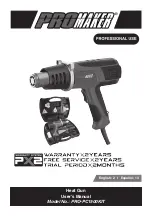
3
Parts & Service: 020 8988 7400 / E-mail: [email protected] or [email protected]
6. Ensure all fixed air connections are properly sealed using teflon tape or
pipe sealant.
7. Check the gauge periodically for accuracy and replace if damaged or
inaccurate.
OPERATION
Under or over inflated tyres are dangerous. Consult vehicle owners handbook
before using this tyre inflator.
Attach the airline hose to the tyre inflator and fully tighten. Use PTFE tape if
needed. Turn on the air supply and check that the airline pressure does not
exceed 8 bar (116psi)
1. Remove the dust cap from the tyre valve and check that the tyre valve is
clean before connecting.
2. Push the connector fully home onto the tyre valve. If the valve leaks, the
connector may need repositioning. Correct position is confirmed by a
steady reading on the gauge.
3. Check the tyre pressure on the gauge.
4. Pull the trigger to inflate the tyre. Re-check the tyre pressure. Note that
when the trigger is pulled, the gauge will show the airline pressure, not the
tyre pressure.
5. To deflate the tyre, partially pull the trigger and check the pressure again.
6. When the tyre pressure is correct, disconnect and remove the connector.
Replace the dust cap on the tyre valve.
IMPORTANT: The air pressure gauge on this product is for guidance only. It is
important that you check the pressure with an approved, calibrated
gauge.
7. Inspect the air hose for wear or damage periodically and replace if
necessary.
8. DO NOT use damaged or leaking hoses. Occasionally clean the product
and lubricate the trigger parts.
CAUTION: THIS PRODUCT MAY HAVE A LOWER WORKING PRESSURE
THAN SOME COMPRESSORS WILL SUPPLY, THEREFORE, AN AIRLINE
REGULATOR SHOULD BE INSTALLED.
CAUTION: AIRLINE LUBRICATORS SHOULD NOT BE USED WITH THIS ITEM






















